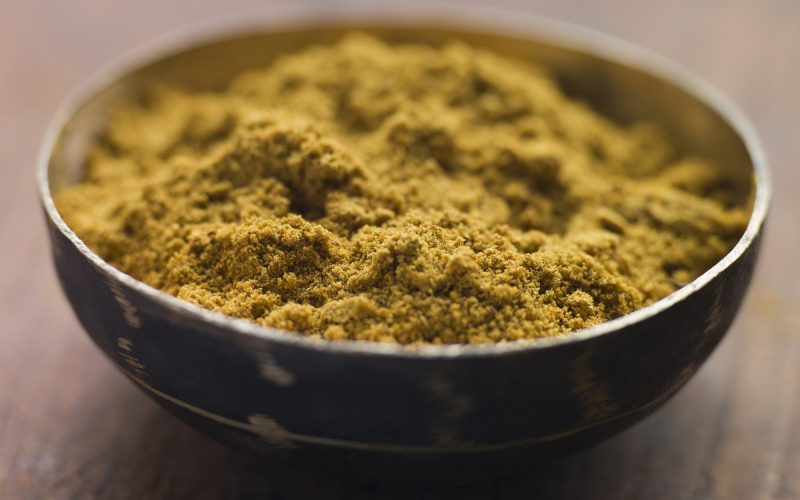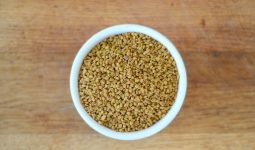Cumin is a multipurpose spice with an earthy flavor that is frequently used in different cuisines all over the world.
It is made from the cumin plant’s seeds and offered whole and ground.
As you learn more about cumin, you’ll discover that it’s crucial to many of the best substitutes for cumin powder that gives your cuisine warmth and depth.
One of the most recognizable flavors and fragrances is that of cumin.
The flavor of meat, stews, and sauces is enhanced by the inherent warmth of this robust, earthy spice. You would have a tasteless dish without it.
As a result, even though it could be tempting to omit a spice if you don’t have it on hand.
Try one of these best substitutes for cumin powder that will be listed on our blog rather than forgoing the strong flavor of your recipe.
Let’s get started!!
1. Caraway Seeds

Caraway seeds are first on our list of best substitutes for cumin powder. Caraway seed is also one of the best substitutes for cumin powder.
The rectangular form and mustardy-brown color of cumin and caraway seeds make them look similar when placed side by side. This makes sense botanically because they are related.
Caraway is a parsley family member, along with coriander and cumin. German cooking frequently uses ground or seed caraway.
Caraway seeds are the best substitutes for cumin powder, even though they are milder than cumin.
A good general rule is to use ground caraway instead of cumin and caraway seeds instead of cumin seeds.
Replace half of the cumin with the caraway, then gradually increase the amount to taste.
2. Fennel Seeds
It has a powerful scent that is warm and earthy when toasted. Similar to the hot aroma of cumin.
But fennel also has the flavor of anise in addition to its earthy aroma and taste.
If you’ve never tasted anise, it tastes a lot like licorice. Additionally, fennel has a mild sweetness.
Start with half the amount specified in the recipe, just like the previous best cumin powder substitutes.
Fennel’s flavor is very potent. Fennel seeds, instead of cumin, have an anise-like licorice flavor.
When you’re in a bind, they won’t taste out of place but won’t have the same smokiness and earthiness as cumin.
3. Coriander Seed
A plant belonging to the parsley, or Apiaceae, is the source of cumin and coriander.
In Indian, Middle Eastern, and Latin American cuisines, both are used to season food (1).
Cilantro is the name for the young stems and leaves of coriander. Cooks can use the dried seeds whole or crushed into a powder.
Although coriander has a milder flavor than cumin, both ingredients impart a lemony, earthy flavor to food.
Add half as much coriander to your meal as you would cumin to replace it. Use a small amount of cayenne or chili powder to increase the heat.
4. Star Anise
Star-shaped pods used to make mulled wine and cider during the winter holidays are how you might be familiar with star anise.
This distinctively shaped spice, however, is also available as a crushed powder.
Star anise has a very different flavor than cumin. It contains spiciness, but a potent licorice flavor balances it.
Even though this spice does not taste exactly like cumin, it is a fun way to enhance a dish’s flavor.
Therefore, try it if you have ground star anise in your closet. Even the whole pods can be simmered in sauces or stews.
5. Nigella Seeds
Nigella seeds are less popular than the best substitutes for cumin powder.
These seeds have a flavor that is just a little bit bitter. The taste has a cumin, oregano, and onion fusion to it; they also have a smokey quality.
Many of the same items that cumin would be used to season on its own go well with this complex flavor.
Therefore, nigella seeds are the best substitutes for cumin powder if you are familiar with them and can access them.
Although they are seeds rather than powdered form, they can still be measured in a 1:1 ratio with cumin.
The tiny black seeds will be evident and significantly alter the appearance of your finished dish, though.
6. Chili Powder
Chili powder is also one of the best substitutes for cumin powder that works well because cumin is one of the main ingredients in some varieties.
In addition to paprika, garlic powder, oregano, powdered cayenne, and onion powder, the mixture may also contain chili powder, so keep that in mind.
This alternative works well when cooking a dish like pinto beans but could not go well with the flavors of some other cuisines, including Indian curries.
Chili powder may also give your food a scarlet tint due to the paprika and cayenne it contains.
Use half the cumin specified in the recipe, as you would with the other substitutions.
Use 1/2 tbsp. (7 grams) of chili powder in place of 1 tbsp. (14 grams) of ground cumin in the recipe.
7. Taco Seasoning
This spice mixture contains cumin, oregano, garlic powder, onion powder, and all the other ingredients found in chili powder.
In addition, salt, black pepper, and red pepper flakes are included in taco seasoning.
You may anticipate that this replacement will add a more nuanced range of flavors than cumin does on its own and a little more heat.
Additionally, remember that different taco seasoning mixes have different salt contents.
Because of this, add taco seasoning to your dish before salt or other ingredients with high sodium content, such as teriyaki and Worcestershire sauces, from the store.
By doing this, you can prevent oversalting your food. Then, tweak it to your liking.
8. Curry Powder
Cumin is frequently found in curry powder blends, making them the best substitutes for cumin powder.
Curry powder incorporates additional flavors like the other spice mixtures already described.
Composition varies among curry powders. They often contain around 20 ground herbs and spices, in addition to cumin, including ground ginger, cardamom, turmeric, coriander, fenugreek, black pepper, and cinnamon.
These spices combine to create a warm, fragrant blend with a deep yellow hue. Curry works well as a replacement for various Malaysian and Indonesian dishes. Just be aware that turmeric will give your food a vibrant yellow color.
9. Garam Masala
Like curry powder, garam masala is a complex spice and herb mixture frequently used in South African, Mauritius, and Indian cuisines.
Because it contains cumin, it is one of the best substitutes for cumin powder.
Garam masala provides a meal with a warm, zesty, and enticing aroma when added towards the end of cooking.
Garam masala can be substituted for other spices by starting with half the cumin specified in the recipe and adjusting to taste.
For maximum flavor, incorporate garam masala towards the end of cooking.
10. Fenugreek Seeds
Due to their bittersweet flavor and potent, slightly nutty scent, fenugreek seeds are the best cumin powder substitutes.
These seeds have a taste that is similar to maple syrup. Fenugreek seeds can be used instead of cumin in Middle Eastern and Mediterranean dishes, including curry, lentil soup, roasted chickpeas, rice, kebab, stuffed tomatoes, and marinades.
Apply the 1:2 ratio when fenugreek seeds are used in place of cumin. Use 1/2 teaspoon of fenugreek seeds for every teaspoon of cumin.
If necessary, taste and add more. Adding a little cayenne pepper may be necessary if you want the dish to be more spicy.
11. Paprika
Paprika is last on our list of best substitutes for cumin powder. A common ingredient in Hungarian cuisine, it has a variety of flavors, from mild to fiery and pungent.
Paprika, famous for its vivid red color, will give your food a crimson hue. Start by substituting with half the amount of cumin specified in the recipe.
Because a little goes a long way; taste as you go.







